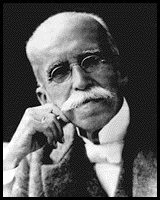Ruy Barbosa is one of Brazil’s great figures and all-around renaissance men: he was a writer, philosopher, lawyer, politican, diplomat, and translator. 
Born in Salvador in 1849, he grew up in Bahia, where his teachers recognized him as a great mind and talent. He went to São Paulo to study law, and began his law career back in Bahia. Soon after, however, he began dabbling in journalism, writing for a local newspaper, and just a year later was promoted to run the company. He was married in 1876, and then began his political career after he was elected to state Congress.
Ruy was an abolicionist and a republican nationalist, and was in favor of independence from the monarchy. As a result, he was sent into exile in Chile and Argentina in 1893. He later traveled to London, and returned to Brazil a few years later. He founded the Brazilian Academy of Letters, and ran for president twice, unsuccessfully. He also worked for various government ministries. He died in 1923 of a pulmonary illness. Rui’s legacy is due to his great intellect, ideals, multilingualism, and political manifestos.
Ruy had homes in Salvador, Rio de Janeiro and Petropólis, and his home in Rio is preserved and the home of the Ruy Barbosa museum, which contains around 50,000 books in Ruy’s vast collection. For more information about this great Brazilian figure, see here.





